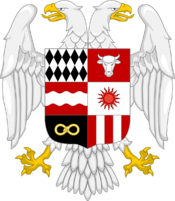Kingdom of Amathia
This article is incomplete because it is pending further input from participants, or it is a work-in-progress by one author. Please comment on this article's talk page to share your input, comments and questions. Note: To contribute to this article, you may need to seek help from the author(s) of this page. |
Kingdom of Amathia Ⱃⰵⰳⰰⱅⱆⰾ Ⰰⰿⰰⱚⰹⰵⰹ Regatul Amathiei | |||||||||||||||
|---|---|---|---|---|---|---|---|---|---|---|---|---|---|---|---|
| 1729–1940 | |||||||||||||||
| Motto: "Ⱇⰹⰰⱅ ⰹⱆⱄⱅⰹⱅⰹⰰ ⰵⱅ ⱂⰵⱃⰵⰰⱅ ⰿⱆⱀⰴⱆⱄ!" ""Fiat iustitia, et pereat mundus!"" 'Let justice be done,though the world perish!' | |||||||||||||||
| Anthem: Long live the King! | |||||||||||||||
| Capital | Arciluco | ||||||||||||||
| Religion | Episemialism | ||||||||||||||
| Demonym(s) | Amathian | ||||||||||||||
| Government | Absolute monarchy (1729-1840) Constitutional monarchy (1840-1925) Amurgist dictatorship (1925-1935) Military dictatorship (1935-1940) | ||||||||||||||
| Legislature | Senate | ||||||||||||||
| Royal Council | |||||||||||||||
| Popular Assembly | |||||||||||||||
| History | |||||||||||||||
• Established | 10th May 1729 | ||||||||||||||
• Disestablished | 23rd August 1940 | ||||||||||||||
| Currency | Libra | ||||||||||||||
| |||||||||||||||
| |||||||||||||||
The Kingdom of Amathia (Amathian: Ⱃⰵⰳⰰⱅⱆⰾ Ⰰⰿⰰⱚⰹⰵⰹ, tr. Regatul Amathiei), was a state in Southeastern Euclea from 1729 to 1940. The Kingdom was founded after the collapse of the Union of Three Nations, with the abolishing of the previous elective monarchy and the creation of an Amathian state under the Gaullican House of Telois-Tresia. The new state abolished many of the freedoms that the Brotherly Union had previously established, but such measures were effective in stabilizing the region and ending the religious conflicts that had plagued Amathia in the past. The new dynasty also took great leaps in modernizing the previously stagnating realm, and reorganizing its administration and military. By the end of the 18th century, Amathia was striving to be a regional power of its own, but it was caught between the conflict interests of Soravia, Gaullica, and Etruria, and its foreign policy was weakened by internal divisions between the mostly pro-Soravian population and the pro-Gaullican elites. The country's failure to truly establish itself as a regional influence, combined with a failed colonial adventure and tensions with Soravia during the Partition of Bistravia led to the Amathian monarchy firmly orienting itself towards Gaullica, remaining firmly aligned with it for the rest of its existence.
The Constitutional Revolution of 1840 introduced true democracy to the new state, but it was in fact less of a revolution and more of a series of reforms. The introduction of elections and the creation of a legislative body in the Senate were important steps, but were also cracks in the stability that the kingdom had otherwise experienced - the regional allegiances and religious differences in the country negatively affecting its politics, while dissatisfaction over perceived territorial injustices on Amathia's borders with Etruria and Soravia slowly grew.
The Great Collapse of 1913 and the chaos that followed undermined public trust in the institutions of democracy, with multiple authoritarian parties rising to fill the void. The Senate proved to be unable to guard Amathia's democracy, with the revolutionary right-wing National Rebirth Movement coming to power, popularly known as Amurgists, after their native name. The Amurgists began a program of aggressive militarization and firmly positioned the country as an important member of Functionalist Gaullica's Entente. As such, Amathia was dragged into the Great War, which would ultimately prove to be disastrous for the state. Despite early victories, Amathia's frontlines turned into bloody stalemates, the and the specter of defeat led to a military coup against the Amurgists, who were becoming more and more fanatical and erratic, a coup supported by Gaullica. The military succeeded in taking control of Arciluco, but the young King refused to acknowledge the Functionalist military junta, which proceeded to execute parts of the royal family and assaulted the Royal Palace, which was protected by royalist forces. The King himself was wounded and was taken into exile, and this event caused the collapse of both the organized royalist forces, and of the junta. With the central government collapsed, the advancing Soravian and Etrurian armies found little resistance, and various Amathian factions sought the support of the new occupying forces as a civil war grasped the country. In the west, the Revolutionary Liberation Front, with the support of Valduvia managed to earn the cooperation of the overstretched Soravian forces, and proclaimed the establishment of the Amathian Council Republic, while in the east, the National Democratic Front, uniting various right-wing forces attempted to earn the support of Etruria proclaimed the Amathian National Republic.


